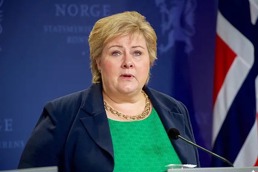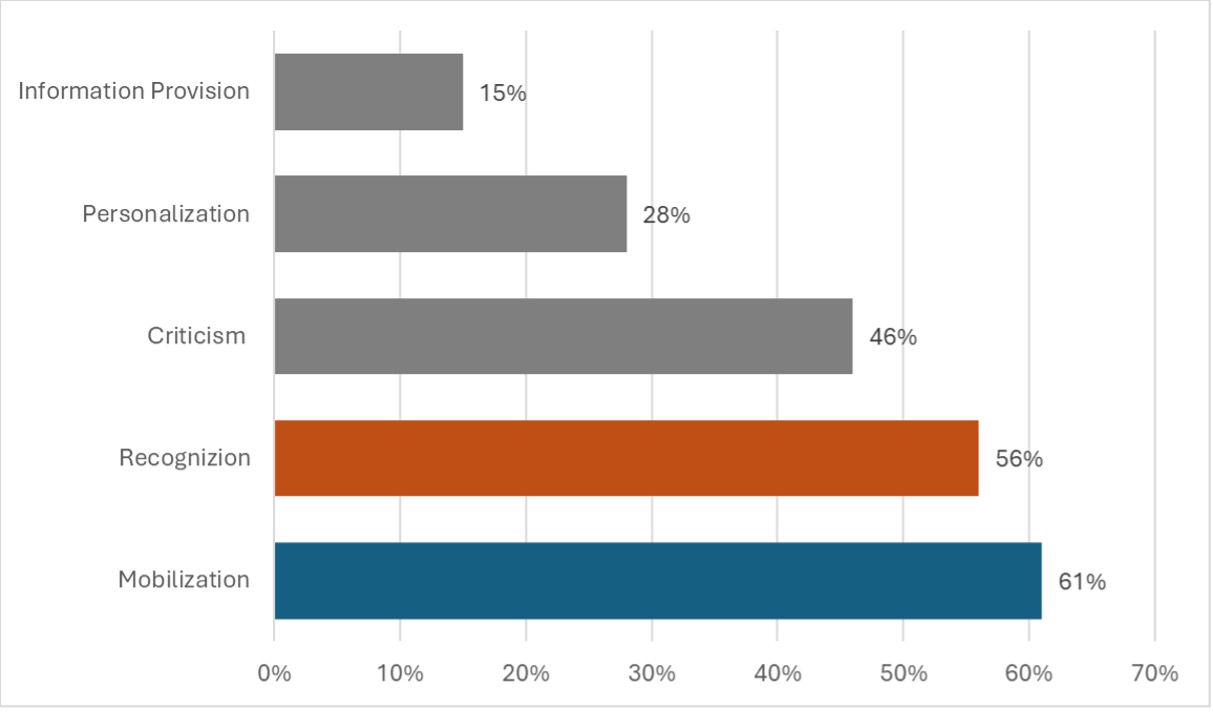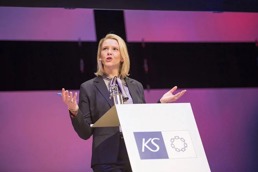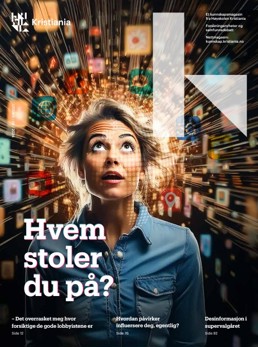Merz' slogan "Forward Again" united voters and brought success
-
Sist oppdatert
24. februar 2025
-
Kategori
Merz's campaign centered on rallying supporters and acknowledging political allies who had grown increasingly frustrated by years of uncertainty and stagnation.
SCIENCE NEWS FROM KRISTIANIA: Political communication
Key takeaways:
-
Friedrich Merz's victory demonstrates the power of a well-crafted slogan in modern political communication.
-
By leveraging #Wiedernachvorne (“Forward Again”) as a unifying message, he effectively resonated with voters' desire for progress and stability, turning his campaign into a grassroots movement that secured electoral success.
-
Merz's strategic focus on mobilization (61% of his Facebook posts) and voter recognition (56%) proved highly effective, writes PhD. candidate Roy Aulie Jacobsen.
(The summary was created by AI and quality assured by the editors).
Under the slogan #Wiedernachvorne (“Forward Again”), Friedrich Merz successfully rallied voters with a promise of economic growth, a stronger role for Germany in the EU, and a return to stability. His campaign centered on rallying supporters and acknowledging political allies who had grown increasingly frustrated by years of uncertainty and stagnation.
In uncertain times, this kind of messaging reassures voters and strengthens their trust in his leadership.
A Campaign Shaped by Crisis
In November 2024, Chancellor Olaf Scholz’s coalition government collapsed, throwing Germany into political turmoil. As a result, the country’s general election was moved up from September 2025 to February.
Friedrich Merz, leader of the Christian Democratic Union (CDU), quickly launched his campaign under the slogan #Wiedernachvorne which translates to “Forward Again.” The message signalled renewal and progress, which became the defining theme of his election strategy.
According to polling data from The Guardian, CDU has been Germany’s largest party since April 2022, with Merz emerging as the frontrunner for chancellor. He is also one of the most active German politicians on Facebook, posting an average of 2.4 posts per day.

Read more:
Mobilizing Supporters and Building Loyalty
An analysis of Merz’s Facebook posts reveals how he blends modern political trends with his own distinct style of communication.
As shown in Figure 1, the majority of Merz’s posts focus on mobilization (61%), followed by recognition (56%), indicating a deliberate strategic effort to engage and energize his supporters.


Read more:
Mobilization: A Call to Action
Friedrich Merz' media presence extends beyond spreading a message. He was building a movement.
Mobilization lies at the heart of his Facebook strategy, with 61% of his posts designed to rally supporters and foster a sense of community. His messages encouraged voters to take action, making them feel like part of something bigger.
A post from January 18, 2025, illustrates this approach:
"Grandiose Stimmung in Hannover! Heute startet unsere Wahlkampftour in Hannover! Gemeinsam kämpfen wir für einen Politikwechsel, der unser Land #wiedernachvorne bringt."
(“Fantastic atmosphere in Hannover! Today, our campaign tour begins in Hannover! Together, we fight for political change that will move our country forward again.”)
With this message, Merz sets an optimistic tone, reinforcing #Wiedernachvorne as the core theme of his campaign.
His slogan is simple. It taps into emotions, inspires action, and aligns with global trends in political communication. In uncertain times, this kind of messaging reassures voters and strengthens their trust in his leadership.
Building Loyalty Through Recognition
Beyond mobilization, Merz engaged voters through recognition, with 56% of his posts dedicated to acknowledging supporters.
He frequently highlighted the hard work of his campaign team and grassroots activists, reinforcing a sense of loyalty and belonging among voters.
In a January 16, 2025, Facebook post, he wrote:
"Man ist nur so gut wie das Team, das hinter einem steht. Ich bin den Mitarbeiterinnen und Mitarbeitern des Konrad-Adenauer-Hauses, den Kolleginnen und Kollegen im Wahlkreis sowie allen Wahlkämpferinnen und Wahlkämpfern in ganz Deutschland sehr dankbar für ihre herausragende Arbeit."
(“You are only as good as the team behind you. I am deeply grateful to the staff at the Konrad Adenauer House, my colleagues in the constituency, and all campaigners across Germany for their outstanding work.”)
Today’s most successful politicians blend modern digital strategies with traditional political values to effectively engage voters.
By openly appreciating his supporters, Merz presents himself as a grateful and inclusive leader. This approach adds a personal touch to his campaign, giving voters a behind-the-scenes look at his team and their efforts.
Personalization in politics is a growing trend. By expressing gratitude, Merz humanizes his leadership and strengthens his emotional connection with voters.
Strengthening the #Wiedernachvorne Message
One of the most interesting aspects of Merz’s communication strategy is how he combined mobilization and recognition to reinforce #Wiedernachvorne.
His mobilization efforts encouraged voters to take action and unite around a shared vision of progress. At the same time, his recognition posts added a personal and emotional dimension to the slogan.
By thanking supporters, Merz directly linked their efforts to the campaign’s success—making #Wiedernachvorne not just a slogan, but a collective goal.

Les temamagasinet om strategisk kommunikasjon:
A Modern Approach to Political Communication
Merz’s strategy mirrors global trends in political communication, where personal, interactive, and forward-looking messaging plays a key role.
Today’s most successful politicians blend modern digital strategies with traditional political values to effectively engage voters.
What made Merz unique is how he adapted this approach to Germany’s traditionally formal and policy-focused political landscape. By emphasizing economic and security issues while using direct calls to action, he attempted to modernize the CDU and made the party more relatable to voters.
Friedrich Merz’s victory offers valuable insights into how modern political communication is evolving. The #Wiedernachvorne slogan could become a symbol of progress that extends beyond Merz’s campaign and shapes future election campaigns, highlighting the impact of strategic social media communication on electoral success.
References:
Clarke, S., & Voce, A. (2025). German election 2025 poll tracker: Which party is leading and who could be chancellor? The Guardian.
Larsson, A. O. (2015). Pandering, protesting, engaging: Norwegian party leaders on Facebook during the 2013 ‘short campaign’. Information, Communication & Society, 18(4), 459–473.
McGuinness, D. (2024, December 16). Germany: Chancellor Olaf Scholz loses vote of confidence. BBC News.
Segesten, A. D., & Bossetta, M. (2017). A typology of political participation online: How citizens used Twitter to mobilize during the 2015 British general elections. Information, Communication & Society, 20(11), 1625–1643.
Wertheimer, T. (2024, November 12). Germany plans February election after coalition collapse. BBC News.
Text: Roy Aulie Jacobsen, Ph.D. candidate at the Institute of Communication, Kristiania University of Applied Sciences.
We love hearing from you!
Send your comments and questions regarding this article by e-mail to kunnskap@kristiania.no.
Siste nytt fra Kunnskap Kristiania
 Kunnskap KristianiaLes mer
Kunnskap KristianiaLes merHva er god utdanning?
I Kunnskap Kristianias nye temautgave har vi invitert forskere og undervisere til å reflektere rundt hvordan vi lærer, og hvordan god utdanning formes. Kunnskap KristianiaLes mer
Kunnskap KristianiaLes merFred for enhver pris?
Kjære Nobelkomité: Det finnes tider da dere ikke bare deler ut en pris, men skriver i verdens moralske grunnbok. Kunnskap KristianiaLes mer
Kunnskap KristianiaLes merShort exchange programmes provide meaningful learning experiences
By participating in an exchange programme, students develop skills such as critical thinking, empathy and intercultural understanding. Kunnskap KristianiaLes mer
Kunnskap KristianiaLes merBlack Friday: kjøpefest eller klimaskam?
Adventstiden handler ikke bare om lys og forventning. Den handler like mye om handelens egen høytidsdag.





